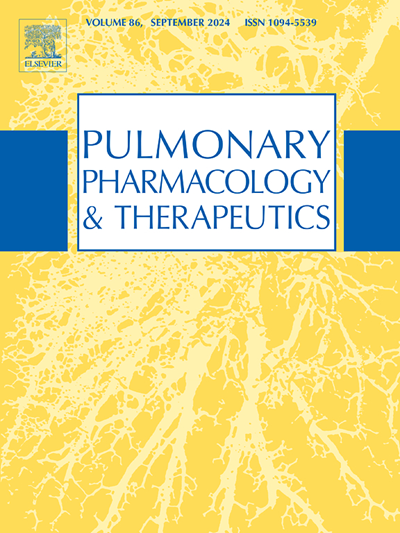新型大环内酯EP395对急性中性粒细胞性气道炎症的影响
IF 2.8
3区 医学
Q2 PHARMACOLOGY & PHARMACY
引用次数: 0
摘要
大环内酯类抗生素已被证明可减少呼吸系统疾病的恶化,包括慢性阻塞性肺疾病(COPD)和哮喘。这种作用被认为是由于大环内酯类的免疫调节特性而不是它们的抗菌活性。然而,长期使用大环内酯类抗生素会导致耐药性的发展,这促使我们开发了EP395,一种与大环内酯类药物药理作用相似但没有抗菌活性的化合物。我们在几种已建立的雄性BALB/c小鼠中性粒细胞气道炎症模型中研究了EP395。口服EP395预处理2周具有显著的抗炎作用,可减少脂多糖(LPS)、烟草烟雾或呼吸道合胞病毒(RSV)诱导的支气管肺泡灌洗液(BAL)的细胞因子和中性粒细胞浸润。EP395在三种模型中均具有与阿奇霉素相当的抑制作用。PDE4抑制剂罗氟司特也被纳入LPS模型作为阳性对照,对中性粒细胞数量有类似的影响。体外中性粒细胞功能测定显示EP395对中性粒细胞有刺激和抑制作用。这些数据表明EP395(一种抗菌活性可忽略不计的大环内酯类药物)在急性中性粒细胞炎症模型和中性粒细胞活性中具有有益的药理活性,并支持其作为慢性阻塞性肺疾病的潜在治疗方法进入临床开发。本文章由计算机程序翻译,如有差异,请以英文原文为准。
Effects of EP395, a novel macrolide, on acute neutrophilic airway inflammation
Macrolide antibiotics have been shown to reduce exacerbations of respiratory diseases, including chronic obstructive pulmonary disease (COPD) and asthma. This effect is believed to be due to the immunomodulatory properties of macrolides rather than their antimicrobial activity. However, prolonged use of macrolide antibiotics can result in the development of antimicrobial resistance, which prompted us to develop EP395, a compound with similar pharmacological actions to macrolides, but without antimicrobial activity. We investigated EP395 in several established models of neutrophilic airway inflammation in male BALB/c mice. Oral pretreatment with EP395 for 2 weeks had significant anti-inflammatory effects, reducing cytokines and neutrophil infiltration into bronchoalveolar lavage fluid (BAL) induced by either lipopolysaccharide (LPS), tobacco smoke or respiratory syncytial virus (RSV). EP395 had comparable inhibitory effects to azithromycin in all three models. The PDE4 inhibitor, roflumilast, was also included as a positive control in the LPS model, with comparable effects on neutrophil numbers. In vitro assays on neutrophil function revealed both stimulatory and inhibitory effects of treatment with EP395. These data demonstrate the beneficial pharmacological activity of EP395, a macrolide with negligible antimicrobial activity, in models of acute neutrophilic inflammation and on neutrophil activity and supported its progression into clinical development as a potential treatment for COPD.
求助全文
通过发布文献求助,成功后即可免费获取论文全文。
去求助
来源期刊
CiteScore
6.20
自引率
0.00%
发文量
41
审稿时长
42 days
期刊介绍:
Pulmonary Pharmacology and Therapeutics (formerly Pulmonary Pharmacology) is concerned with lung pharmacology from molecular to clinical aspects. The subject matter encompasses the major diseases of the lung including asthma, cystic fibrosis, pulmonary circulation, ARDS, carcinoma, bronchitis, emphysema and drug delivery. Laboratory and clinical research on man and animals will be considered including studies related to chemotherapy of cancer, tuberculosis and infection. In addition to original research papers the journal will include review articles and book reviews.
Research Areas Include:
• All major diseases of the lung
• Physiology
• Pathology
• Drug delivery
• Metabolism
• Pulmonary Toxicology.

 求助内容:
求助内容: 应助结果提醒方式:
应助结果提醒方式:


